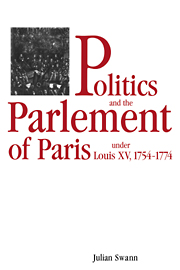Book contents
- Frontmatter
- Contents
- Dedication
- Preface
- List of abbreviations
- 1 Introduction: the Parlement of Paris
- 2 Historians and the parlements
- 3 The king and his judges
- 4 The parti janséniste and the refusal of the sacraments crisis, 1754–1756
- 5 Managing the parlements: crisis and compromise, 1756–1758
- 6 The Parlement and fiscal politics, 1756–1763
- 7 Choiseul and the politics of appeasement, 1758–1763
- 8 An unhappy peace, 1763
- 9 Defending La Chalotais: the Brittany affair, 1764–1766
- 10 In the eye of the storm, 1767–1770
- 11 The fall of the Parlement of Paris, 1770–1771
- 12 Conclusion: Maupeou and beyond
- Bibliography
- Index
3 - The king and his judges
Published online by Cambridge University Press: 13 March 2010
- Frontmatter
- Contents
- Dedication
- Preface
- List of abbreviations
- 1 Introduction: the Parlement of Paris
- 2 Historians and the parlements
- 3 The king and his judges
- 4 The parti janséniste and the refusal of the sacraments crisis, 1754–1756
- 5 Managing the parlements: crisis and compromise, 1756–1758
- 6 The Parlement and fiscal politics, 1756–1763
- 7 Choiseul and the politics of appeasement, 1758–1763
- 8 An unhappy peace, 1763
- 9 Defending La Chalotais: the Brittany affair, 1764–1766
- 10 In the eye of the storm, 1767–1770
- 11 The fall of the Parlement of Paris, 1770–1771
- 12 Conclusion: Maupeou and beyond
- Bibliography
- Index
Summary
LOUIS XV AND THE PROBLEMS OF GOVERNMENT
In order to understand the politics of eighteenth-century France, it is necessary to reflect upon the nature of ancien régime society and government. Unfashionable though it may seem, the only starting place for such a study is with an assessment of the character and personality of the king. Louis XV was one of the most talented men to sit upon the French throne, handsome, intelligent, a skilled geographer and cultivated patron of the arts. In 1744, he had been acclaimed Louis ‘le bien-aimé’ by a grateful people after his recovery from a serious illness while on campaign at Metz, and in the following year he was crowned by the laurels of victory after the battle of Fontenoy. The king's words to his ecstatic son after that costly battle bear eloquent testimony to his understanding and humanity. He declared: ‘see what a victory costs … the blood of our enemies is always the blood of men. The true gloire is to spare it.’ By his fortieth birthday, in February 1750, all seemed set for a long and glorious reign. Yet, like his predecessor, Louis XV died, in May 1774, unlamented. The king's own personal conduct played a significant part in his fall from grace. By behaving like one of his libertin courtiers, he made the mistake of thinking that a king of France was entitled to a private life. Aristocrats and even princes of the blood could consort with dancers from the opera, but the majesty of the throne was tarnished by his patronage of a private brothel in the pare aux cerfs.
- Type
- Chapter
- Information
- Publisher: Cambridge University PressPrint publication year: 1995

